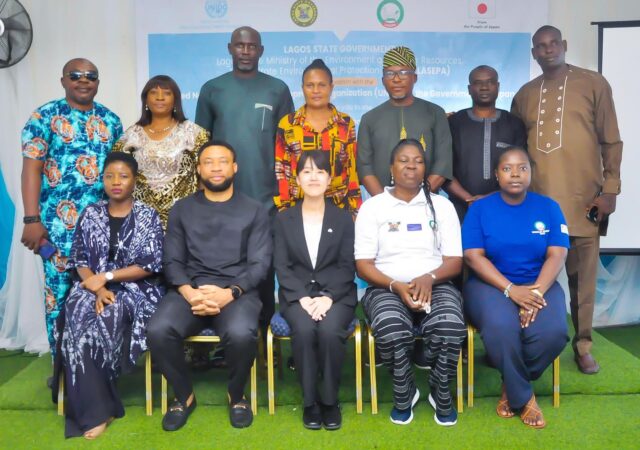- …….Unchecked Free zone operations amongst causes of industrial pollution.
- …….Regulatory challenges hinder pollution control efforts
Environmental engineers in Lagos have raised concerns about the significant impact of industrial wastewater on pollution levels in the state. They attribute the ongoing pollution of the Lagos Lagoon primarily to untreated industrial effluents, which continue to pose a severe and recurring threat.
This condemnation was voiced during the recent Monthly Technical Session of the Nigerian Institution of Environmental Engineers (NIEE) Lagos Chapter, held virtually on Wednesday 19th, 2024. The session focused on the theme “Industrial Pollution and its Impact on the Lagos Lagoon.”
Chairman of NIEE Lagos, Engr Yusuf Majolagbe, highlighted the critical situation, stating, “Despite its importance for millions of people as a vital resource, the Lagos Lagoon faces increasing threats from industrial pollution.”
He referred to a 2021 study by the Lagos State Environmental Protection Agency (LAEPA), which revealed that industrial operations along the lagoon are responsible for more than 60% of its pollution load. The manufacturing, oil, and chemical industries are identified as significant contributors to this environmental challenge.
The Lagos Lagoon, spanning approximately 635 square kilometers, is a vital ecological and economic asset for Nigeria’s most populous city. It has long been a source of sustenance and livelihood for millions, providing essential resources such as fish, water for domestic use, and a means of transportation. The lagoon supports a rich diversity of marine and bird life, playing a crucial role in maintaining regional biodiversity.
However, in recent years, Studies have shown that industrial discharges, untreated effluents, and chemical run-offs have significantly degraded water quality. According to a 2018 report by the Nigerian Institute for Oceanography and Marine Research, over 75% of the industrial effluents released into the Lagos Lagoon exceed permissible limits for pollutants such as heavy metals, oil and grease, and suspended solids.
Guest Speaker at the Technical Session, Engr Richard Davies, emphasized that the Lagos Lagoon receives substantial volumes of untreated industrial wastewater and other effluents, often untraceable due to discharge practices such as nighttime dumping. He pointed out that many industries operating within free zones evade accountability to state regulators, enabling them to disregard environmental laws with impunity.
To promote an attitudinal change towards environmental sustainability in the policies, processes and operations of these industries, Engr. Davies proposed:
- a reassessment of current regulations,
- enhanced collaboration between agencies, and
- heightened commitment to environmental stewardship by both industries and government.
In contrast however, participants criticized the stance of environmental agencies in Lagos, particularly LASEPA, arguing that merely acknowledging industrial nighttime discharge without traceability is insufficient. They urged the adoption of new methods to trace pollutants to their origins and apprehend nighttime dischargers to address the issue effectively.
According to them, these measures should also encompass:
- Exploring cutting-edge pollution control technologies, such as membrane bioreactors and advanced oxidation processes, which have proven effective in significantly reducing industrial pollutants.
- Strengthening legislation and enforcing stringent regulations. While frameworks like the National Environmental Standards and Regulations Enforcement Agency (NESREA) Act exist, effective enforcement remains a challenge. Enhancing these frameworks and ensuring strict adherence is crucial for meaningful progress.
- Involving local communities through awareness campaigns and empowering citizens to participate in pollution control efforts. Successful educational programs and community monitoring initiatives from other regions can serve as models for adaptation here.
The Engineers emphasize that protecting the Lagos Lagoon is a shared responsibility.
“Drawing lessons from successful global case studies is invaluable. For example, the restoration of the Chesapeake Bay in the United States through coordinated pollution control efforts provides a blueprint for similar actions in Lagos.”
“The challenges ahead are daunting, but so too is our collective potential for innovation and change,” said the NIEE Lagos Chapter Chairman.
Let’s make a difference. Together, we can ensure that Lagos Lagoon remains a thriving and healthy ecosystem, supporting its diverse life forms and enriching the lives of all Lagosians.
“There must be concerted effort to mitigate the harm caused by these pollutants. The Nigerian Institution of Environmental Engineers – Lagos State Chapter is always ready to collaborate with any group towards achieving cleaner, greener, and more sustainable waterways for Lagos State.”
The Environmental Engineers, collectively ended their deliberations with a call to action, advocating for the Lagos State Government, parastatals, and private organizations to unite in addressing industrial pollution, not just in the Lagos lagoon but all surrounding water bodies in the state.
Among the attendees were Engr Sesan Odukoya, Immediate Past National Chairman of NIEE, and Engr Abiola Kosegbe, Immediate Past Lagos Chapter Chairman, who presented a certificate to the guest speaker. Also present were Rajesh Hooblal, Environmental Lead of Dangote Industries Ltd, and Engr Mrs Helen Lanke Taiwo, Vice Chairman of NIEE Lagos, who concluded the session with a vote of thanks.







